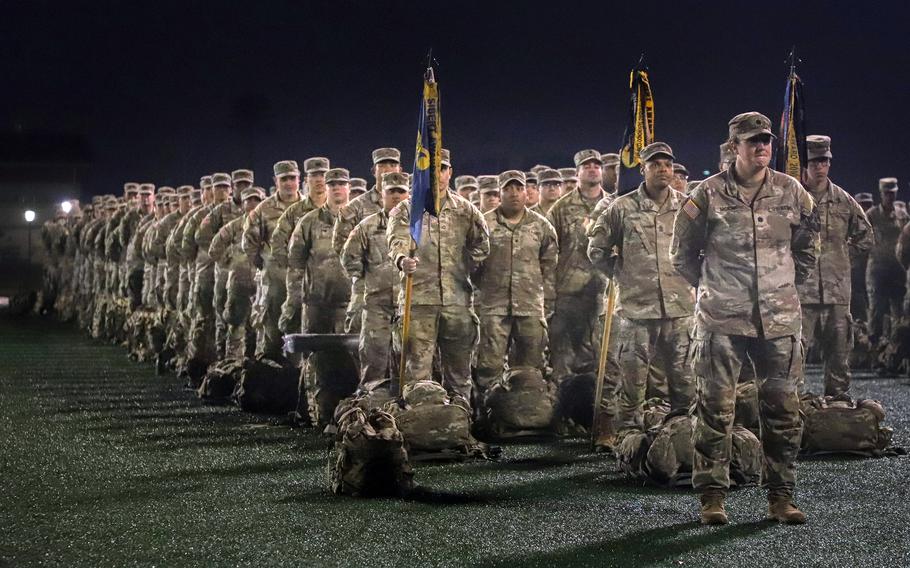
Soldiers assigned to the 2nd Infantry Division stand in formation at Camp Humphreys, South Korea, Nov. 21, 2024. (Jiwon Yun/U.S. Army)
SEOUL, South Korea — U.S. service members ordered to South Korea without their families after Oct. 1 will serve 24 months in the country, double the current tour length, according to U.S. Forces Korea.
The new policy comes five months after the Defense Department extended tour lengths in South Korea to 36 months for service members accompanied by their family members.
Troops now serving in South Korea or receiving their orders prior to the Oct. 1 start date will not be forced to extend their tours, the command said in a news release Tuesday.
The extended tours are meant to reduce the number of permanent changes of station by U.S. service members. USFK said the change will improve military families’ quality of life and enhance “both readiness and stability” of the U.S. military posture in South Korea.
“Extending unaccompanied tours to 24 months enables service members to build deeper operational expertise, fosters continuity in leadership, and reduces turnover in mission-critical roles,” USFK director of personnel Air Force Col. William Parker said in the release. “This change reflects our commitment to both the mission and our people. USFK also recognizes that stability enhances resilience and connection with host communities.”
Based on their needs, individual service branches will have some flexibility in implementing the change after Oct. 1, Parker told Stars and Stripes in an embargoed interview at the command’s headquarters on July 3.
In February, DOD announced similar changes for troops who bring their families to South Korea. Under that policy, which also goes into effect Oct. 1, accompanied service members are required to stay in the country for three years, up from two.
Some service members whose requests for accompanied tours are denied due to logistical or medical resources at their new base will serve only one year in South Korea, according to the release.
The changes account for threat conditions on the Korean Peninsula and will not affect the overall number of U.S. troops there, Parker said.
“The policy change has nothing to do with bringing more people here,” he said. “Service members want to serve by and with their families.”
USFK plans to beef up its infrastructure to accommodate more dependents on its bases, Parker said July 3. Although these billets are “at or near capacity,” the command will be “increasing capacity to support accompanied tours rather significantly” going forward, he added.
At Camp Humphreys — headquarters of USFK, Eighth Army and the 2nd Infantry Division about 40 miles south of Seoul — construction plans include several barracks and the new East Elementary School scheduled to open sometime next year.
Additionally, efforts are underway to allow for a “very limited” number of service members to bring their dependents with them to smaller U.S. bases that exclusively host unaccompanied troops, such as Kunsan Air Base, 115 miles southwest of Seoul, Parker said.